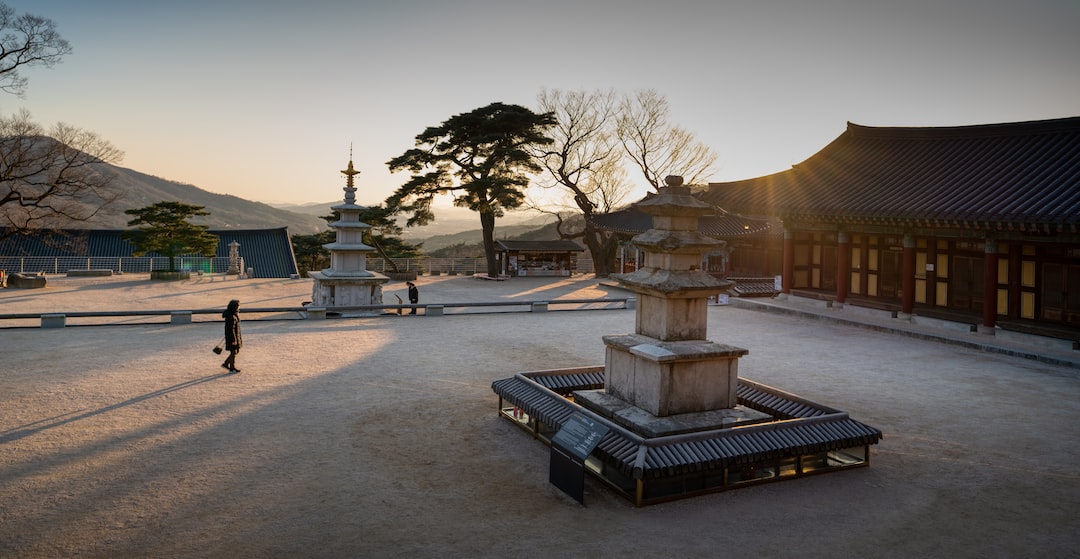Table of Contents
Exploring February in South Korea: A Travel Guide
Visiting South Korea in February promises a unique experience. From snow-capped mountains to bustling cities, February in South Korea offers a wide range of activities that are sure to make your trip unforgettable. Whether you’re a first-time traveler or a frequent visitor, this guide will provide you with all the information you need to make the most of your time in South Korea.
The Weather in February
The weather in February in South Korea is cold and clear. Temperatures range from highs of 8℃ to lows of -6℃. While there may be some days of light snow, the weather is generally dry and sunny. It’s a great time to get out and explore the country. Pack a warm coat, insulated scarf and gloves, and you’ll be ready for whatever the weather throws at you.
Skiing in South Korea
If you’re an avid skier, February is the perfect time to visit South Korea. The country has numerous ski resorts, from the world-renowned Yongpyong Resort to the smaller, family-friendly Muju Resort. Wherever you choose to ski, you’re sure to find plenty of slopes, terrain parks, and activities to keep you occupied. Plus, you’ll be surrounded by breathtaking mountain views.
Exploring Seoul
South Korea’s capital city of Seoul is a must-visit during your trip. With its unique blend of modernity and ancient culture, Seoul offers something for everyone. Highlights include the Gyeongbokgung Palace, which is over 600 years old, the bustling and colorful Namdaemun Market, and the N Seoul Tower, which offers stunning views of the city. February is also the perfect time to experience some of Seoul’s traditional festivals, such as the Lotus Lantern Festival.
Korean Cuisine
Korean cuisine is known for its flavorful and spicy dishes. Traditional dishes include bibimbap, a rice dish served with vegetables, beef, and chili sauce; kimchi, a fermented cabbage dish; and samgyeopsal, grilled pork belly. For a unique experience, try a Korean barbecue restaurant, where you can cook your own food over a charcoal grill. There are also numerous international restaurants in South Korea, so you’re sure to find something to satisfy your taste buds.
The DMZ
The Korean Demilitarized Zone (DMZ) is a unique experience. Located on the border between North and South Korea, it’s a glimpse into one of the world’s most heavily guarded borders. Visitors can take a tour of the DMZ and learn about the history of the Korean War. It’s an eye-opening experience that will stay with you for a long time.
Korean Shopping
South Korea is renowned for its shopping, and Seoul in particular is known for its bustling markets and boutiques. Myeongdong is one of the most popular shopping districts in the city, while Dongdaemun is home to some of the biggest malls in the country. For a unique experience, try a traditional market, such as the Namdaemun Market. Here, you’ll find a wide range of clothes, accessories, and souvenirs at affordable prices.
Temples and Palaces
South Korea is home to a number of stunning temples and palaces. The most famous is the Gyeongbokgung Palace in Seoul, which is over 600 years old. Other notable temples and palaces include the Changdeokgung Palace, the Seokguram Grotto, and the Haeinsa Temple. These sites are great for learning about Korean history and culture, and the architecture is simply breathtaking.
Hiking and Outdoor Activities
South Korea is home to a number of stunning national parks, which are perfect for hiking and sightseeing. Popular spots include Jirisan National Park, Seoraksan National Park, and Naejangsan National Park. For an extra dose of adventure, you can try rock climbing, white-water rafting, and zip-lining. No matter what you choose to do, you’re sure to have an unforgettable experience.
Korean Culture
South Korea is a country with a rich and vibrant culture. From traditional music and dance to the more modern K-Pop scene, there’s something for everyone. Visit a traditional market and sample some local food, or take in a K-Pop concert for a truly unforgettable experience. You’ll also find a range of traditional crafts and art, as well as museums and galleries.
Festivals and Events
February is a great time to experience some of South Korea’s traditional festivals and events. The Lotus Lantern Festival is one of the most popular, and takes place in Seoul in late February. Other festivals include the Jinhae Gunhangje Cherry Blossom Festival, the Hwacheon Sancheoneo Ice Festival, and the Seollal Festival, which marks the start of the lunar new year.
Nightlife
South Korea is renowned for its vibrant and exciting nightlife. From karaoke bars and nightclubs to traditional Korean bars, there’s something for everyone. Popular areas include the Hongdae district and the Gangnam district. The country also has a wide range of casinos, so if you’re feeling lucky, why not give them a try?
Summary
South Korea offers a unique and unforgettable experience in February. Whether you’re looking to ski, explore ancient temples and palaces, or experience the nightlife, there’s something for everyone. You’ll find a wide range of activities, from traditional festivals and events to outdoor activities and shopping. So, what are you waiting for? Get out and explore South Korea in February!












